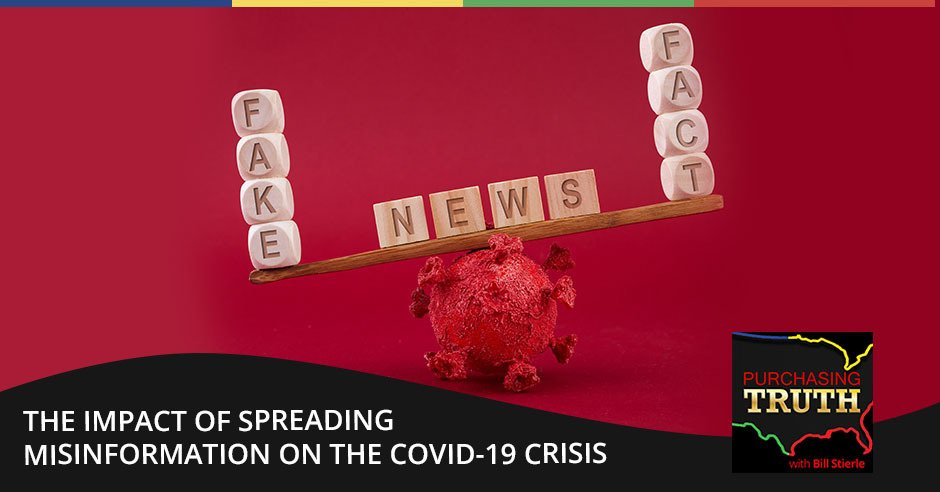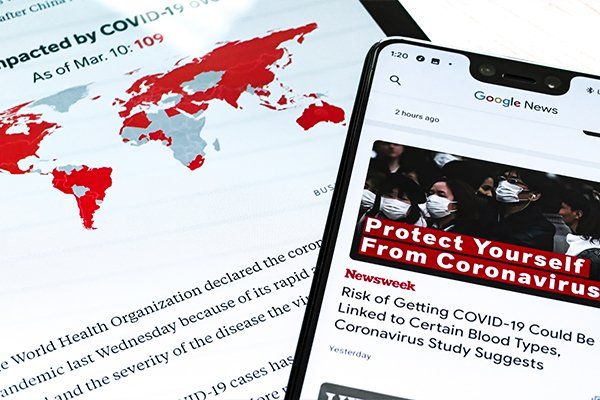The Impact of Spreading Misinformation on the COVID-19 Crisis
Subscribe Today!
As the world enters the vaccination stage of the COVID-19 pandemic, it now faces a brand new battle: the fight against people spreading misinformation. With all the different beliefs surrounding the vaccine, many people's lives are put at stake. Instead of highlighting why this medical intervention must be prioritized, everything is focused on stirring outrage and sparking heated arguments. Bill Stierle and Tom discuss how some news networks and social media sites deliver partial truth just for the sake of boosting online engagement, even if it means messing with the facts. They also talk about why personal beliefs are so hard to influence or change depending on the people who influence them or the places they get their news from.
---
Watch the episode here
The Impact of Spreading Misinformation on the COVID-19 Crisis
There's a big elephant in the room of misinformation that we're going to take a bit of a dive into.
I appreciate this topic because one of the things that misinformation does is it's counting on appealing to the belief of the person. That's what misinformation counts on. It's saying, “This person is believing this thing.” It's more exciting to believe and talk about unicorns rather than it is to talk about the latest discovery in science. You got to shake your head a little bit about that because wouldn't it be great if we're lifting each other up through the place of, “That person discovered that, I want to figure out how I can discover something that also adds to the dance of life. I want to participate in that.”
That's not what's happening. What happens is there is a judgment towards laziness, scientific rigor, and to be a person that wants to create or work through a struggle to get someplace. It is hard. Anybody that's written a book might have this experience, anybody that's built a business and has dealt with the different challenges over the years of what it takes to do that would know about the struggle. It's a lot easier from the non-struggle place to embrace misinformation quicker than it is to fight for or adjust our belief to the fact that’s true. It's harder to embrace facts because we've invested time in a belief.
Nothing demonstrates that more in our current culture here in the United States than the COVID vaccine situation, and how these beliefs have been established in a huge part of the US population that they don't need the vaccine or fear that the vaccines are safe or that COVID is real or isn't. Young people think, “It's not going to impact me more. It's an old person's disease,” or whatever their belief is. We're seeing it in how the number of people getting vaccines slowed down to our crawl where all the major big mass vaccination sites in the country were closed. You can get a vaccine, it's pretty easy. You don't even need an appointment now. You could walk up because there's not a lot of demand for people to get them now.
That's a big part of it too. There's an ease in getting it. People are under economic pressure, work pressure to say, “I've now got to do this. I'll wait until tomorrow. I don't need it right away. I'm going to wait to see how the numbers are going to go. I'm going to see where it goes because it was a hoax.” This is unsettling because you take a pandemic and then all of a sudden you stretch it further than it needs to be stretched. I would have liked this to be done in six months if we would have got it through mass testing and contact tracing. It’s very simple stuff, “Has anybody been around you?” Yes. “You need to do something. We need to find anybody else that you've been around or where you've been around so that we can let those people know ahead of it.” That's really problematic.
That didn't happen. In 2020, everybody's looking for vaccines, "When is this going to end?" "When we get the vaccine, we’ll distribute it." They work hard to distribute it in the first half of 2021, and a lot of people get it but not as many as they wanted to. We're at this point where the misinformation was coming very much from where you’d expect it, where a lot of people get their news from like Fox News, Newsmax, OANN and The Daily Wire. People were not trusting the vaccine because of the misinformation that was being spread there. Now we're seeing the result or the evidence of that. The hospitals are filling up again. It's happening all over the country but in a much larger proportion in these states which tend to be more red states where people would be listening to those news sources spreading that misinformation. That's where all cases are. It's 1 in 5, 20% of new cases are in Florida.
That's hard to hear. You can counter that narrative of propaganda that says, “Don't Fauci my state” or whatever, but it's a short-term boost to people trusting you because they voted for you. I'm going to go with my belief that you're telling me the truth. You're telling me this other person is lying or this person is limiting the experience. Meanwhile, what is the worth of human life? All of a sudden, it's not until the person impasses with a certain level or profiles that people take it in and go like, "This is serious. I better pay attention." All of a sudden, everyone’s on the same page.
This is starting to happen across the country on this particular issue about the COVID vaccine. The other shocking piece of data that has come out and is absolutely irrefutable is about the COVID deaths in Texas. Since February 2021, I remember the vaccine was out. People were being vaccinated at that time. In fact, I have good friends in Texas. Texas rolled out the vaccine to people that weren't immunocompromised and younger age groups faster than a lot of states did. I think it’s largely because they didn't have as much demand for the vaccine as other states.
Since February 2021, there have been 8,787 deaths from COVID in the state of Texas. Do you know how many people who died have had the vaccine or were fully vaccinated? It was 43. That means 99.5% of everyone who died due to COVID-19 in Texas from February 8th to July 14th, 2021 were unvaccinated. If you're somebody who had beliefs that have been established through a lot of this misinformation in your sources of news, and then you see those numbers. I can imagine that's a bit of a shock and it makes you question your belief, wouldn't it?
It depends on the size of the belief. If the belief is it's a hoax, then that's a big belief so then I'll discount everything. I'll discount the numbers, the reporting and the doctors. I'm going to question everyone because I was sold a hoax. There was this one thing that's been trending about a doctor in Alabama. This doctor feels sad. She's putting the breathing tubes in a person's lungs so they have enough oxygen so they can breathe. As they're putting it in, the person asked, "Can I get the vaccine?" It's too late for that now. The "It's too late for that now” narrative is troublesome because you had a chance to give your body a chance, and you passed on the chance because you met your need for choice. You met your need for independence. No one's going to tell you what to do, no one's going to force you to do something. All those sentences can be the person's worst enemy.
I can appreciate that a person wants to meet their need for choice and independence. I can also appreciate that people feel scared and fearful about doctors. They feel scared and fearful about vaccines. I felt disheartened about the misinformation that the person that is in that spot is running through their head, “I thought this was a hoax. I thought that it was like a cold.” All they do is rerun the moments of misinformation they've been given that has occupied the place of truth. The cost of truth when this takes place, you can't be honest if you're looking at two different worldviews. You can't be straight with the person because the person is holding onto the worldview.
Because this is a communication show, what do you say or do when somebody saying, “I don't want to take the vaccine?” You got to be able to say something to that person. There are usually two questions that I recommend. Question number one is, “Could you be feeling a little bit more scared or you don't want to take it because there might be something around safety? Could you be feeling doubtful and skeptical because you're struggling with the truth or the trust that you have from the news media?” Get those two things apart from each other because those two things, when they're together, keeps the person not wanting to vaccinate or not wanting to go to the place of protection.
It depends on the circle that you run in. For me, I'm up to fifteen people that are 1 degree or 2 degrees of separation from me who died of COVID, and a new one that came in is sick and in the hospital. It's hard because even though I'm meeting my own need for protection and for physical safety, and I'm extending trust to science, it can be a little bit of a dance. Sometimes they have this prescription and then they take it back because this thing was too strong. It was too much. It had this side effect. It worked but the trials didn't quite give us the thing we wanted, but now we're going to put it in a different form and try it this way instead.” There is a little bit of testing hypothesis in science and it's not a straight certainty. This is where misinformation is fertilized. The fertilization of misinformation is science can't give you 100% certainty, therefore, this other answer might be possible.
That's very interesting and that's where we see a lot of organizations taking a partial truth and removing the context from it to create misinformation. That's very scary.
The news media has its own set of struggles with how to keep its own business shop open, attracting eyeballs and becoming interesting. Scientists have got to put out information, do tests and put hypotheses out. Tom, you may have heard that red wine is an aphrodisiac or it’s good for your heart. The data is spun in a way just to get the tagline, not to promote a full truth. Yet, when it comes to science that has to do with life or death, we've been softened. Our minds have been softened away from rigorous thinking about extending trust. We've been shown crop circles that don't come around anymore because it was a hoax out of England by these two guys, then there were copycat people in different countries that started doing crop circles.
It's unsettling. “They're all rotating in the right direction.” People's brains want to look at the possibility. “Somebody is covering something up. We’re not fully getting the truth.” You just don't like the truth that you're getting because it's not interesting. It's not interesting that a farmer and his son went out at night and made crop circles. It's more interesting that aliens created it.
That's the whole point. It's attention for eyeballs, especially on social media. There's an article that is very comprehensive that was written and published by NPR talking about The Daily Wire. It's very interesting because this is a major source of information news for a lot of people on Facebook. The Daily Wire has become an influence machine. Outrage As A Business Model is the title of the article. It’s how Ben Shapiro who's the founder of The Daily Wire is using Facebook to build an empire because so many people are getting news through Facebook. There's a lot of data in this article about how many people are engaging with this.
The monthly engagement that The Daily Wire has gotten, which is likes, shares and comments is how they define engagement, of nine US news sources on Facebook and five mainstream organizations and four non-mainstream or conservative specific ones. For more than a year, The Daily Wire has gotten more engagement than the five mainstream outlets like The New York Times, The Washington Post, NBC News, CNN and Fox News. The other ones including The Daily Wire, Breitbart News, TheBlaze, The Western Journal, literally The Daily wire has gotten more engagement than all the other ones combined. It is amazing.
How they're doing it is very interesting. They talk about taking a partial truth and stripping away context. If you strip away enough context, you're going to create outrage and feed into people's biases. You're dominating their attention, but you're also fueling and creating misinformation. The reality of COVID vaccines and the people that are now dying from it all being unvaccinated is one example that is a result of such misinformation being propagated.
It's so huge. Being able to get clicks, likes, engagements, and be able to do that for outrage message is a very limbic brain function. It's engaging the fight, flight and freeze part of the mindset that we have as human beings. Our body is built around protection. Because our brain is built around protection, it would rather protect a belief rather than rewrite the belief to have the truth. Let me give an example of this. One of the common things that I do in communication is to have people change a certain belief. In order for them to change their communication, they got to change this one belief.
I asked them right at the beginning, “Would you be willing to change a small belief if it made your life wonderful? It's going to feel uncomfortable to change it, but if you'd be willing to change it, it's going to make a difference. The person then has to say the word yes. If they don't say yes, I ask them, “This is a belief. Would you be willing to do that?” “Yes.” Now that they've made their yes, they've got over the line. Their brain is going to sit with some doubt and skepticism but I know that I'm going to validate it in a new way in a second. Here's the belief I have them changed, that there's no such thing as a good or bad feeling, that there is no such thing as a positive or negative feeling.
This is tough because throughout their childhood, their parent's lives, they were taught, “Feel good, don't feel bad. Think positive, don't think negative.” Now, here's this wacky communication guy going, “There's no such thing as a good or bad feeling, positive or negative feeling.” What replaces that belief is feelings are only indicators that tell you how your body is taking something. This is weird because if you and I think about it, when we woke up this morning, we might have felt tired because our need for rest was not met fully. We didn't have a good night of sleep, or we felt energized because our need for rest was being met. You were feeling thirsty and you met that thirst, and now you feel comfortable. I could do this all day.
A person's feeling or motivation is coming from a need. What winds up happening when you're trying to change a belief, the person's going like, “No, if I change this, I have to change the way I'm thinking. I have to change that that person is pushing my buttons and I don't have any control over it.” That's what outrage is. The person is pushing their buttons and they have their interests in mind. They don't have my interests in mind at all. They're just trying to keep me engaged so that I can be sold to by a sponsor, marketing, advertising and a branding experience. They want to take offline my rational decision-making process. It's keeping the person in either the passenger seat, the back seat or at worst, in the trunk. There are a lot of people in the trunk because they can't make a decision. They go, “I'm in this car and this one media personality is driving it. I'm in the trunk. They're not even in the back seat. They're not even enjoying the ride.
Ask all the 500-plus people that were arrested and filed charges of being picked up from the insurrection. They're not having a happy ride. They're going like, “Isn't Donald Trump going to save me?” He said that one time, “I'll pay the legal expenses.” He says it once and an entire group of people believes, “He'll do it for me.” He’s not paying your legal expenses. He won't even take your phone call. It's very unsettling. Do you feel how unsettled our conversation gets all of a sudden?
I can feel it. It's very interesting to think about feelings are not good or bad, they're just indicators. That changes a lot of things.
It does. Nobody can push you around anymore. Once you have that as a solid ground, it becomes the other person is in pain about something and then they are outraged people. Shapiro is an outraged guy. He's going to say things that are going to affect people's need for respect. It's going to enlist it in loyalty. Loyalty is a very important need for us as human beings. It hooks into survival mechanisms.
People don't even realize it when they're on Facebook that is benefiting from this outrage machine. They're not interested and turning it off because they make all sorts of money based on engagement. The more people engage with posts, the more that feeds into their business model. In fact, the article from NPR goes into a little bit about how Facebook was creating a tool to quantify engagement of posts and some interesting things. They shut it down and decided to stop doing it when they started seeing the results because that was going to mess with their business model.
The thing that’s important for at least people to try to learn and research is that an organization like The Daily Wire does not claim to be a traditional news source. That's not their goal to deliver news or truth. On its About page, the site states very clearly that The Daily Wire does not claim to be without bias and it goes on to say, "We're opinionated, we're noisy and we're having a good time.” What does that tell you about the information that you're getting through something like The Daily Wire?
It’s their need for connection being met at the expense of their population. It is something that they're not interested in having accountability for. If you're keeping engagement to take place and it solidifies a person's belief against their own best interest, it seems like some dark shadowy stuff against their own interest, which means that it prevents them from being for their own interest. There's clearly enough to go around. The challenge is how you get people to believe and participate in that collaborative and cooperative marketplace versus the way that people are believing is, “There's not enough, survival of fittest. I've got to win and in order for me to win big, you got to lose big.” That's a little bit of the problem with truth and the misinformation apparatus. The misinformation apparatus is about building outrage. It's weird to say this from a physiological place, but 74% of a person's hearing stops listening when they're angry. It shuts off their ears. They can't even hear.
Those beliefs are going to be hardened.
The beliefs become hardened because it hits the person's ears. Once it tilts past the experience of aggravated and mad and it goes to the place of anger, they become entrenched. They're looking for the next person that's going to reinforce that belief structure.
That's why this opinion shows on the mainstream media like Fox News. CNN and MSNBC are no different where they have a lot of opinion shows. Those opinion shows are feeding into those biases and they're propagating outrage and a lot of times, creating outrage because that suits their business model. That's why it's so surprising that this week, Sean Hannity came out very vocally seemingly without an ideological agenda to speak very candidly about vaccines stating that he believes in science and in the vaccine. It was surprising to a lot of people to see him say that. I think it's a result of what we were talking about earlier, the numbers coming out of the states like Texas, Florida, Georgia, and other states about all the people dying of COVID are unvaccinated. I think he realized that's a lot of the people that listen to him.
The motivation of connection with his audience, his sponsors and the people because if it goes further than this, and he was to stay any longer on the narrative, and businesses would have had to start shutting down again because of his rhetoric, they'll pull and he has no place to go. “You cost us $100,000 or $1 million because of the revenue we lost over the fourth quarter of 2021. We're going to let you have it by never advertising with you again because of the money you cost us. You have some eyeballs over there, but the money and the deaths that you caused because so-and-so died in our organization, they listened to you.” The game of misinformation is tricky because you're trying to get engagement, but you also are causing damage at the same time. That part is tough.
You're getting engagement at the expense now of people's lives and don't forget our economy. Our economy requires people to be moving freely, going to restaurants and engaging in all sorts of activities. You can't do that if everybody's sick and dying. We have to take a step back and have more mass mandates or shutdowns because people aren't getting the vaccine to make this virus disappear because we get herd immunity.
That's the thing that we can look at next. What kind of language narrative is going to be taken? Who has to get sick? Who has to die in order for it to rise to the level of urgency? During the AIDS epidemic, it was Rock Hudson, and then other predominant Hollywood and political types that got sick and died. It’s very challenging for us to take this one on because this one is what this generation’s HIV was in the late ‘80s, early ‘90s.
Thanks so much. I appreciate your insight and having that discussion about misinformation.
I appreciate it, Tom. Thanks, everybody.
Important Links:
- https://www.NBCNews.com/news/us-news/it-s-too-late-alabama-doctor-shares-final-moments-covid-n1274659
- https://TheHill.com/policy/healthcare/563402-white-house-florida-accounts-for-20-percent-of-all-new-covid-infections
- https://www.NPR.org/2021/07/19/1013793067/outrage-as-a-business-model-how-ben-shapiro-is-using-facebook-to-build-an-empire
- https://www.CNN.com/videos/media/2021/07/20/sean-hannity-vaccines-covid-19-vpx-new.cnn/video/playlists/business-media/New Paragraph
Love the show? Subscribe, rate, review, and share!









